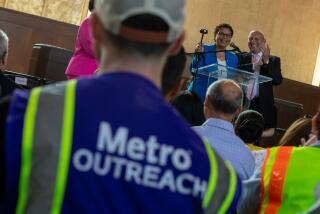Look Back and Learn, MTA
- Share via
Members of the Metropolitan Transportation Authority’s board probably thought they had successfully concluded their secretive search for a new chief executive. The selection of Theodore Weigle Jr. was announced to a public that had no prior knowledge of who was under consideration, no information on how the search had been conducted, no hint of what criteria had been used.
But if the board’s goal was to present a fait accompli, someone forgot to convince Weigle to play along. The last thing that the tarnished MTA needed was to have its “done deal” choice reject the job, and that’s exactly what happened last week.
Now the board members ought to engage in some quick soul-searching. There are ways they can do it better the next time:
* Avoid the Franklin White mistake: The MTA’s first chief executive was the board’s scapegoat for the agency’s woes. All of its problems were laid at his feet, as if his dismissal by the board solved everything. Anyone willing to accept this job has to wonder whether he or she too will be used up and spat out. In other words, a multiyear, performance-based contract with clearly established, objective criteria is a good idea.
* Avoid the Joseph Drew mistake: A gun-sly board wrongly decided against conducting a national search for another outsider to replace White. It turned instead to insider Drew, who promised to deliver on every transit project, despite the existence of a $1-billion structural deficit. He resigned after less than a year. Weigle’s rejection of the job is no reason to repeat the same hasty mistake. A new national search is essential; don’t forget that the best recovery plan that the MTA’s own interim leadership could come up with was excoriated by federal transportation officials as fiscally unrealistic.
* Pull yourselves together: Think about it. Anyone considering the job of CEO has to be aware that state legislators are considering all manner of changes for the board and the MTA as a whole. The patience of federal transportation officials has eroded. Not exactly the most stable situation to walk into. Which means that the one reassuring thing that a prospective transit CEO ought to be able to count on is a supportive board. Instead, he knows that one board member called on Washington to halt funds for the subway project. He knows that others seek to extend rail projects when it’s uncertain that there will be enough funding for the construction already underway. And that one board member has argued that it might be time to put the MTA into state receivership and to repeal its primary local funding source.
Just who does the board expect to covet, or even consider, this job under these circumstances, whatever the salary offer?
It’s apparent to all reasonable observers that the board is a major part of the MTA’s problem. The board’s image is not unlike that of the smoker who boasts of quitting but lights up on the back stairs. Talk isn’t going to convince anybody this time around. The only thing that will is sustained, reformed behavior. Right now, no one could be criticized for feeling that the board simply isn’t up to that.
More to Read
Sign up for Essential California
The most important California stories and recommendations in your inbox every morning.
You may occasionally receive promotional content from the Los Angeles Times.
![Irvine, CA - July 16: Gina Osborn, shown at her home, is the former head of Metro security is suing the agency for firing her after she filed a claim with the Inspector General. Photo taken at her home Tuesday, July 16, 2024. Gina Osborn, a former FBI agent who was the agency's first chief safety officer, "was summarily terminated by [Chief Executive] Stephanie Wiggins," said her attorney, Marc R. Greenberg. Osborn says in claims that she butted heads with Metro's CEO over security as the agency was trying to put a good face on its efforts to clean up crime and loitering. (Allen J. Schaben / Los Angeles Times)](https://ca-times.brightspotcdn.com/dims4/default/c1419ae/2147483647/strip/true/crop/5981x4000+9+0/resize/320x214!/quality/75/?url=https%3A%2F%2Fcalifornia-times-brightspot.s3.amazonaws.com%2F46%2F07%2Fa88ac0b7466895ee4e137839d93c%2F1467168-me-former-metro-security-chief-18-ajs.jpg)









